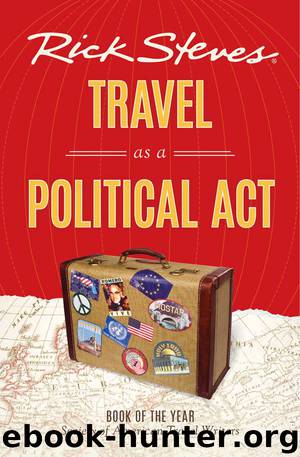Rick Steves Travel as a Political Act by Rick Steves

Author:Rick Steves
Language: eng
Format: epub
Publisher: Avalon Travel
Published: 2015-01-28T16:00:00+00:00
Like great cities in emerging economies around the world, Istanbul bustles with hope for a bright future.
And yet, this ancient city is striding into the future. During my visit, everyone was buzzing about the upcoming completion of the new tunnel under the Bosphorus, which would give a million commuters in the Asian suburbs of Istanbul an easy train link to their places of work in Europe. This tunnel (which opened in 2013) is emblematic of modern Turkey’s commitment to connecting East and West, just as Istanbul bridges Asia and Europe. I also see it as a concrete example of how parts of the developing world are emerging as economic dynamos.
Stepping out of my shoes, I entered the vast, turquoise (and therefore not-quite-rightly-named) Blue Mosque. Hoping for another déjà vu, I didn’t get it. Something was missing. Yes…gone was the smell of countless sweaty socks, knees, palms, and foreheads soaked into the ancient carpet upon which worshippers did their quite physical prayer work-outs. Sure enough, the Blue Mosque had a fresh new carpet—with a subtle design that keeps worshippers organized the same way that lined paper tames printed letters.
The prayer service let out, and a sea of Turks surged for the door. Being caught up in a crush of locals—where the only way to get any personal space is to look up—is a connecting-with-humanity ritual for me. I seek out these opportunities. It’s the closest I’ll ever come to experiencing the exhilaration of body-surfing above a mosh pit. Going outside with the worshipping flow, I scanned the dark sky. That scene—one I had forgotten was so breathtaking—played for me again: hard-pumping seagulls powering through the humid air in a black sky, surging into the light as they crossed in front of floodlit minarets.
Walking down to the Golden Horn inlet and Istanbul’s churning waterfront, I crossed the new Galata Bridge, which made me miss the dismantled and shipped-out old Galata Bridge—so crusty with life’s struggles. Feeling a wistful nostalgia, I thought of how all societies morph with the push and pull of the times.
But then I realized that, while the old bridge is gone, the new one has been engulfed with the same vibrant street life—boys casting their lines, old men sucking on water pipes, and sesame-seed bread rings filling cloudy glass-windowed carts.
Strolling the new Galata Bridge and still finding old scenes reminded me how stubborn cultural inertia can be. If you give a camel-riding Bedouin a new Mercedes, he still decorates it like a camel. I remember looking at tribal leaders in Afghanistan—shaved, cleaned up, and given a bureaucrat’s uniform. But looking more closely, I could see the bushy-gray-bearded men in dusty old robes still living behind those modern uniforms. On a trip to Kathmandu, I recall seeing a Californian who had dropped out of the “modern rat race”—calloused almost-animal feet, matted dreadlocks, draped in sackcloth as he stood, cane in hand, before the living virgin goddess. Somehow I could still see Los Angeles in his eyes. The resilience of a culture can’t be overcome with a haircut and a shave—or lack of one—or a new bridge.
Download
This site does not store any files on its server. We only index and link to content provided by other sites. Please contact the content providers to delete copyright contents if any and email us, we'll remove relevant links or contents immediately.
| Historic | Information Systems |
| Regional |
Man-made Catastrophes and Risk Information Concealment by Dmitry Chernov & Didier Sornette(6022)
The Revenge of Geography: What the Map Tells Us About Coming Conflicts and the Battle Against Fate by Kaplan Robert D(4077)
Zero Waste Home by Bea Johnson(3840)
COSMOS by Carl Sagan(3625)
Good by S. Walden(3560)
In a Sunburned Country by Bill Bryson(3544)
The Fate of Rome: Climate, Disease, and the End of an Empire (The Princeton History of the Ancient World) by Kyle Harper(3067)
A Wilder Time by William E. Glassley(2863)
Camino Island by John Grisham(2799)
Organic Mushroom Farming and Mycoremediation by Tradd Cotter(2692)
The Ogre by Doug Scott(2685)
Human Dynamics Research in Smart and Connected Communities by Shih-Lung Shaw & Daniel Sui(2502)
Energy Myths and Realities by Vaclav Smil(2494)
The Traveler's Gift by Andy Andrews(2463)
9781803241661-PYTHON FOR ARCGIS PRO by Unknown(2372)
Inside the Middle East by Avi Melamed(2357)
Birds of New Guinea by Pratt Thane K.; Beehler Bruce M.; Anderton John C(2255)
A History of Warfare by John Keegan(2246)
And the Band Played On by Randy Shilts(2210)
